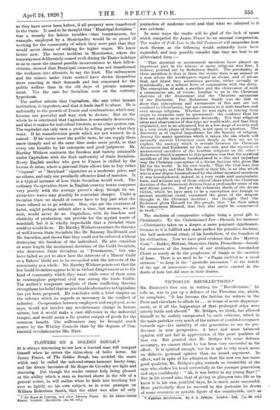FLOWERS ON A GOLDEN BOUGH.*
IT is always interesting to see how a learned man will comport himself when he enters the china-shop of belles lettres. Sir James Frazer, of The Golden Bough, has avoided the snare which may be called the nut-and-steam-hammer booby-trap, and his dream fantasies of Sir Roger de Coverley are light and charming. But though the reader cannot help being pleased at the ability which a man so learned shows in the role of a general writer, he will realize when he finds him touching but ever so lightly on his own subject, as in some passages on William Robertson Smith, that the other was after all only • Sir Roger its Coverlets. and other Literary Pieces. By Sir James George Frazer. London : Macmillan. Ids. eat. net.j
journalism of moderate merit and that what we admired in it was extrinsic.
In some ways the reader will be glad of the lack of space which compelled Sir James Frazer to an unusual compression. The reader of Folk-Lore in the Old Testament will remember how such themes as the following would ordinarily have been expanded, and may possibly consider that they are beat in an abbreviated form :— " That mystical or sacramental sacrifices have played an important part in the history of many religions was first, I believe, pointed out by Robertson Smith. The peculiarity of these sacrifices is that in them the victim slain is an animal or -a man whom the worshippers regard as divine, and of whose flesh and blood they sometimes partake, either actually or symbolically, as a solemn form of communion with the deity. The conception of such a sacrifice and the observance of such a communion are, of course, familiar to ns in the Christian doctrine of the Atonement and the Christian sacrament of the Eucharist. But Robertson Smith was the first to show that conceptions and sacraments of this sort are not confined to Christianity, but are common to it with heathen and even savage religions. Whether he was right in tracing their origin to totemism may be questioned : the evidence thus far does not enable us to pronounce decisively. But that religious ideas and observances of this type are world-wide, and that they originated, not in an advanced, but in a low stage of society and in a very crude phase of thought, is not open to question. The discovery is of capital importance for the history of religion. Among the many questions which it raises, the one which will naturally interest Christians most deeply is, How are we to explain the analogy which it reveals between the Christian Atonement and Eucharist on the one aide, and the -mystical or sacramental sacrifices of the heathen religions on the other ? Robertson Smith's answer to this question was that the mystical sacrifices of the heathen foreshadowed in a dim and imperfect way the Christian conception of a divine Saviour who gives His life for the world. In his own words, "Mat the God-man dies for His people, and that His death is their life, is an idea which was in some degree foreshadowed by the oldest mystical sacrifices. It was foreshadowed, indeed, in a very crude and materialistic form, and without any of those ethical ideas which the Christian doctrine of the Atonement derives from a profounder sense of sin and divine justice. And yet the voluntary death of the divine victim, which we have seen to be a conception not foreign to ancient sacrificial ritual, contained the germ of the deepest thought in the Christian doctrine ; the thought that the Redeemer gives Himself for His people, that " for their sakes He consecrates Himself, that they also might be consecrated in truth." ' " The students of comparative religion bring a great gift to Christianity. To the Christianized Jew—Disraeli, for instance —Christianity takes on a deeper, a more poignant significance, because in it is fulfilled and made perfect the primitive doctrine, the half-understood ritual, of his forefathers, of the founders of his civilization. Now we have good evidence that the " Mystery Gods "—Balder, Mithras, Dionysius, Osiris, Prometheus—beauti- ful creatures of the founders of our civilization, foreshadow Christ as surely as do the prophecies of Isaiah or the sacrifice of Isaac. There is no need to be " a Pagan suckled in a creed outworn " to keep in the " apostolic succession " of the beliefs of the age of innocence—the age that never existed in the deeds of men but did once in their desires.


































 Previous page
Previous page